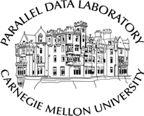
PDL Talk Series
AUgust 19, 2021
TIME: 12:00 noon - to approximately 1:00 pm EDT
PLACE: Virtual - a zoom link will be emailed closer to the seminar
 SPEAKER: Aurick Qiao, Head of Engineering, Petuum Inc.
SPEAKER: Aurick Qiao, Head of Engineering, Petuum Inc.
Pollux: Co-adaptive Cluster Scheduling for Goodput-Optimized Deep Learning
Pollux improves scheduling performance in deep learning (DL) clusters by adaptively co-optimizing inter-dependent factors both at the per-job level and at the cluster-wide level. Most existing schedulers expect users to specify the number of resources for each job, often leading to inefficient resource use. Some recent schedulers choose job resources for users, but do so without awareness of how DL training can be re-optimized to better utilize the provided resources.
Pollux simultaneously considers both aspects. By monitoring the status of each job during training, Pollux models how their goodput (a novel metric we introduce that combines system throughput with statistical efficiency) would change by adding or removing resources. Leveraging this information, Pollux dynamically (re-)assigns resources to improve cluster-wide goodput, while respecting fairness and continually optimizing each DL job to better utilize those resources.
In experiments with real DL jobs and with trace-driven simulations, Pollux reduces average job completion times by 37-50% relative to state-of-the-art DL schedulers, even when they are provided with ideal resource and training configurations for every job. Pollux promotes fairness among DL jobs competing for resources based on a more meaningful measure of useful job progress, and reveals a new opportunity for reducing DL cost in cloud environments. Pollux is implemented and publicly available as part of an open-source project at https://github.com/petuum/adaptdl.
BIO: Aurick recently graduated from CMU with a PhD in Computer Science and now leads the engineering team at Petuum.
CONTACTS
, PDL Co-Director
RMCIC 2311
, PDL Co-Director
(412) 268-3064
GHC 9109
Executive Director, Parallel Data Lab
VOICE: (412) 268-5485
PDL Administrative Manager
VOICE: (412) 268-6716